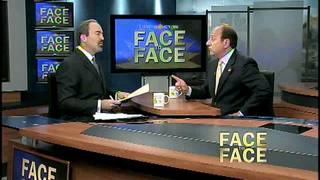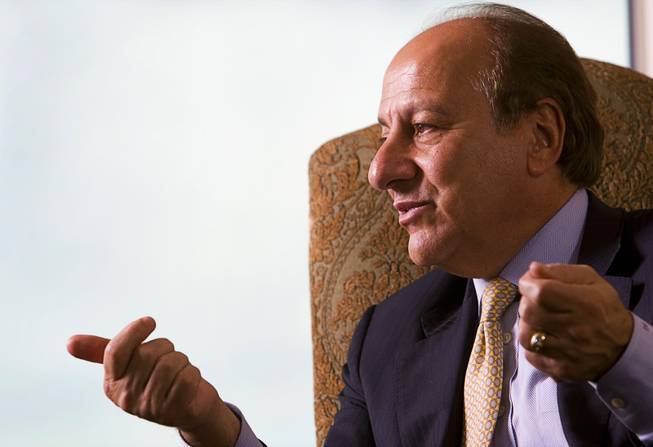Thursday, June 16, 2011 | 1:07 p.m.
Georgiou on "Face to Face"

Viewing video requires the latest version of Adobe's Flash Player
Sun Coverage
WASHINGTON — In any race for public office, candidates usually have to account for two things: their pasts as private individuals, and their positions on the issues.
In the race to fill Nevada’s second U.S. Senate seat, the candidates have been clarifying policy positions for weeks. But as of Wednesday, everybody in the race to fill Nevada’s second Senate seat has disclosed their personal finances — except the guy who was in charge of looking after the country’s finances.
Two years ago, Harry Reid appointed Byron Georgiou to the 10-member Financial Crisis Inquiry Commission, tasked with investigating what led to the crash of the U.S. financial services industry, and rooting out how the companies at the center of it got caught in questionable deals, misled the public on the state of their financial holdings and overstated their ability to manage clients’ investments.
Now, it seems, similar concerns may be hounding Georgiou as he attempts to build momentum for his underdog Senate candidacy, challenging Rep. Shelley Berkley for the Democratic nomination.
Records show he’s been slapped with tax liens of varying sizes in counties in California about 10 times, dragged into court to settle outstanding debts of hundreds of thousands of dollars, and had property seized to cover money owed to consumers in one of his former business enterprises.
Although most of those matters have been resolved, it appears Georgiou is still scrambling to get the appearance of his financial house in order. Congressional lawmakers and candidates were to file financial disclosure reports in mid-May. Georgiou, the first of the mainstream candidates to declare his Senate bid, received a 90-day extension.
Since then, in late May, he closed the books on a pending lien worth $162,138.04 against a property in Mono County, Calif., that had been lingering since 2003. It’s a tax lien Georgiou had paid almost $40,000 toward several years ago, which originally stood at $204,279.01 — but on June 1, Mono County registered that the rest of the lien had been released because it had been “recorded in error.”
Georgiou said the liens weren’t the result of mismanagement, they were the result of personal upheaval: He filed his tax returns late, he said, because he was going through a divorce.
“All taxes were paid in full and on time,” Georgiou said. “It was only discovered recently that, due to a clerical error, Mono County failed to record the release and still showed the lien.”
Georgiou, who has lived in Las Vegas since 2005, is a self-made millionaire. He’s been a successful lawyer, businessman, lobbyist, organizer and public servant; his success started as head legal adviser to California Gov. Jerry Brown in his earlier administrations.
From that career, Georgiou has acquired as many accolades as he has friends in high places. He’s been widely praised for his business acumen: Georgiou’s self-titled investment company boasts a portfolio of cutting-edge industries, including an all-electric vehicle development company based in North Las Vegas, a health information technology services company in California, and several media, clean energy and real estate enterprises.
He’s also been praised as a moral crusader: He campaigned for farm workers’ rights, and was one of 30 lawyers to recover $7.5 billion for duped investors in the notorious Enron scandal. And according to Georgiou’s first-quarter campaign finance report, several colleagues from those ventures remain Georgiou supporters, donating generously to his campaign.
Those credentials, and the thousands upon thousands of dollars Georgiou has donated to Nevada and national Democrats in the past few elections — including a $2,400 gift to Reid’s re-election fund in 2009, shortly before he was appointed to the commission — appear to have him in a position of political power: He was named among the Top 10 most politically influential people in Nevada in February.
But because this Senate race is the first time since the early 1990s that he’s been a candidate, it’s the first time his recent personal financial history, and not just his business accomplishments, have been a matter of public interest.
Although documents show a few smaller liens still outstanding, the bulk of Georgiou’s personal run-ins with the financial authorities date from about a decade ago, just before the Enron scandal broke — his work on that being what solidified his star-power and national reputation.
In 1999, Bank of America won a case against Georgiou in San Diego’s Superior Court, in which he was ordered to pay $170,975.57, apparently to clear a debt. He paid the amount, in full, in 2000.
Then in 2000, records from San Diego County show Georgiou was slapped with a $154,113.91 tax lien, for taxes from 1997 and 1998. He apparently paid it off a few years later, and the lien was released in 2005.
Georgiou says these episodes were natural bumps in the road for a self-styled businessman on the make, and that actually, his experience dealing with financial lows as well as highs puts him in solidarity with most homeowners in Nevada.
“Does this sound familiar to anyone in Nevada? ... Too many Nevadans have had a similar experience with a bank,” Georgiou said in a statement to the Sun. “We had a home equity line at Bank of America — after making every payment on time and in full — they called in the entire line of credit and wanted immediate payment in full. I could not find anything in our loan agreement that said they could do that and I didn’t believe they had the right to call in a loan that we had made every payment on.
“ ... I contested them closing the loan on me when I was using that money to fund a business,” Georgiou said, adding that later, “I was fortunate enough to have success in another venture and made the decision to stop contesting BofA’s decision and simply paid off the loan in full.” But it doesn’t appear to have been the smoothest period for Georgiou’s corporate finances either.
In 2001, Georgiou’s venture into the high seas went under when Talisman, a casino boat he had a part-ownership stake in, was seized and ordered sold by a U.S. District judge in Texas for failure to pay debts to creditors.
Georgiou was named in the suit brought by American V Ships for $114,000, and according to reports published at the time, would later countersue for what he claimed was $10 million owed him. He added to the Sun that no outside creditors, only employees of Talisman, sustained losses, as they were paid “in full through the chapter proceedings.”
In 1998, as Georgiou’s more significant debts were apparently accruing, Georgiou was also busy steering the Nevada-based Mednet, formerly Medi-Mail company, through Chapter 11 bankruptcy proceedings as its newly appointed chairman. According to news reports at the time, the company was simultaneously being sued by investors for more than $600,000 in what they characterized as “worthless” stock sold before Georgiou’s tenure as chairman.
Georgiou does not appear to have been named in any of those suits, and again, counts the experience as an opportunity to make lemonade out of lemons.
“I served for some years as a member of the board of directors of Mednet, a publicly held corporation, agreeing for its last few months of life to take over as chair to guide the company through an orderly liquidation,” Georgiou said in the statement, adding that one of his most successful present ventures, Health Fusion, was born of the Mednet experience.
The idea that Georgiou’s past and present are closely wound, for better and for worse, is also supported by a look at his current campaign supporters. Most of Georgiou’s thus-far-reported donations are from the professional colleagues and friends he’s made over the years based in California or New York; only 26 donors with Nevada addresses are reported donating to his campaign in the first quarter. They contributed about $57,000 of the approximately half-million dollars he’s raised from donors other than himself (Georgiou put half a million dollars into his campaign, bringing his on-hand receipts to just shy of $1.1 million, as of the end of the first quarter).
Georgiou’s campaign donation records list an impressive array of high-profile securities lawyers, personal injury lawyers, other commissioners (it just submitted its final report in January), and colleagues: partners from his law firm of Robbins, Geller, Runman and Dowd and their family members have donated generously to his campaign, as is the case with many of the recipients of Georgiou’s investment operations, including bigwigs at InterMedia Partners, HealthFusion and Corinthian Capital.
But Georgiou also appears to be pulling in a fair amount of cash from those who were close to him as he was going through his rougher ride. Family members of the former CEO and chairman who proceeded him at Mednet, Robert Bagdasarian and Sol Lizerbram, appear to have donated a combined $10,000 to his campaign, and the family of Bill Lerach, one of his co-Enron prosecutors that was later implicated in a kickback scheme for which he went to prison, appears to have donated $15,000.
Although the campaign donations lightly obfuscate the source of those donations, Georgiou hasn’t really hid from any of this: in an interview with the Las Vegas Sun’s sister publication, VEGAS INC, last month, Georgiou predicted he’d be questioned about his continued connections with those in his past who had fallen from grace.
“I can assure you, if I’m successful in this race, somebody or other, either Shelley or Heller, is going to accuse me of having been affiliated with these guys who later each spent a year in federal prison,” Georgiou said, referring to Lerach and his firm partner, Mel Weiss. “The crimes for which they were convicted related to events that occurred 20 years ago in the late ’80s and ’90s.”
He explains the hiccups in his own record in similar fashion.
“After 40 years as an active participant in my community, in business, politics and law, I’ve won some and lost some,” he told the Sun in a statement. “Every minute we spend focusing on the few blemishes on my record is a minute we are wasting not talking about the real issues that concern hard working middle class Nevadans ... these are the problems I intend to address and propose solutions for during the next 17 months of this campaign.”


Join the Discussion:
Check this out for a full explanation of our conversion to the LiveFyre commenting system and instructions on how to sign up for an account.
Full comments policy